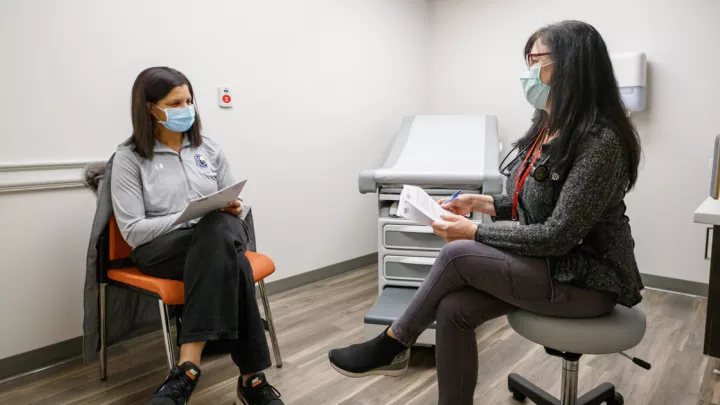You asked, we answered: Do COVID vaccines damage the brain and heart?

Question:
Is it true that the COVID-19 vaccines kill heart and brain cells?
Answered by infectious diseases expert Kelly Cawcutt, MD:
A recent case report published in the Multidisciplinary Digital Publishing Institute has raised questions about the mRNA COVID-19 vaccine in relation to encephalitis (inflammation of the brain) and myocarditis (inflammation of the heart muscle).
Much more study is needed to see if there is a genuine connection between these conditions and the COVID-19 vaccine. While a case like this one produces interesting findings that may warrant more study, it’s important to accurately interpret the report in context.
Do COVID vaccines kill brain and heart cells?
“No, there is no solid evidence to back up this claim,” says Dr. Cawcutt. “COVID-19 vaccines do not go into your body and acutely kill brain and heart cells. What matters is how a person’s body interacts with the spike protein, either from the infection itself or from the vaccine. This report shows a severe, adverse event, but this one case doesn’t prove that vaccines kill brain and heart cells in the general public.”
There are many variables in the case report to consider
“This particular case is an extraordinarily rare event when you consider the number of people who’ve received the vaccine,” explains Dr. Cawcutt. “Because a single case report doesn’t have the ability to definitively prove cause, it raises questions that could warrant further investigation.”
The patient in this study experienced cardiac symptoms after the first vaccine that required medical care and treatment. The patient recovered slowly and received a second vaccine. At that point, the patient started to experience behavior and psychological changes and an increase in Parkinson’s disease symptoms. After requiring further treatment, the patient never fully recovered and was vaccinated a third time.
“We don’t know if we’re really looking at an over-immune response to the vaccine itself or the actual COVID-19 infection,” adds Dr. Cawcutt. “The patient also had other medical problems: adverse reactions to prior vaccination, underlying neurologic disease and potentially, an irregular autoimmune response that may have all contributed to this particular case. From a heart cell perspective, the study wasn’t looking at the direct lethal effect of the vaccine component on heart cells.”
Additional factors to consider:
- According to the report, the patient had significant adverse organ symptoms after each vaccine dose. This means there wasn’t a sudden reaction to the vaccine but rather a continued digression over time
- The patient’s Parkinson’s disease (and any other existing medical conditions) may have had a more considerable impact on the results than the study stated
- Since the progression of the patient’s health continued to decline, severe reactions should have suggested caution in the decision to administer additional vaccinations
“In cases like this, there are many factors to consider,” adds Dr. Cawcutt. “When a person experiences an adverse autoimmune response this severe, we would consider carefully whether or not to administer additional vaccines.”
It’s essential to keep the risks and benefits in perspective
While there have been rare cases of encephalitis related to COVID-19 infection and reports of rare vaccine side effects, it’s essential to keep things in perspective.
- Consider the minimal number of people that have experienced severe reactions after receiving the vaccine to the billions of people who have received the vaccine with common to no side effects
- Weigh the risk and benefits by the numbers. The differences are significant when looking at the actual risk of experiencing severe illness, long COVID, hospitalization or death from the COVID-19 infection itself to the number of people who have experienced rare, severe reactions after vaccination
Learn more about the COVID-19 vaccine and other COVID-related topics.






